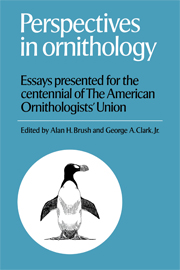 Perspectives in Ornithology
Perspectives in Ornithology Published online by Cambridge University Press: 04 August 2010
The cooperative rearing of young is a topic of considerable interest to both biological and social scientists. Such behavior reaches its extreme development in many eusocial insect societies, where vast numbers of individuals live their entire lives as sterile workers, rearing young but never themselves becoming reproductives (Wilson 1971). Such sterile castes have not yet been reported among vertebrates. However, there are numerous instances in which individuals of vertebrate species (most of them avian) forego breeding for a significant portion of their adult lives and spend such time helping to rear offspring that are not genetically their own.
There are three fundamental questions surrounding the topic of cooperative breeding in animals. First, what role have ecological factors played in promoting the development of such aid-giving societies? Second, how can such seemingly altruistic behavior be explained in terms of natural selection theory? Third, what behavioral tactics will members of such societies adopt to maximize their own fitness when interacting with others?
In this chapter, we will attempt to address each of these three topics. Before doing so, however, it is necessary for us to define our terms. We use “group” to describe any long-lasting association of more than two individuals (Rowley et al. 1979). An “auxiliary” is any mature, nonbreeding member of a reproducing group. It may or may not provide aid in the rearing of young. “Cooperative breeding” refers to any case where more than two birds provide care in the rearing of young.
To save this book to your Kindle, first ensure no-reply@cambridge.org is added to your Approved Personal Document E-mail List under your Personal Document Settings on the Manage Your Content and Devices page of your Amazon account. Then enter the ‘name’ part of your Kindle email address below. Find out more about saving to your Kindle.
Note you can select to save to either the @free.kindle.com or @kindle.com variations. ‘@free.kindle.com’ emails are free but can only be saved to your device when it is connected to wi-fi. ‘@kindle.com’ emails can be delivered even when you are not connected to wi-fi, but note that service fees apply.
Find out more about the Kindle Personal Document Service.
To save content items to your account, please confirm that you agree to abide by our usage policies. If this is the first time you use this feature, you will be asked to authorise Cambridge Core to connect with your account. Find out more about saving content to Dropbox.
To save content items to your account, please confirm that you agree to abide by our usage policies. If this is the first time you use this feature, you will be asked to authorise Cambridge Core to connect with your account. Find out more about saving content to Google Drive.